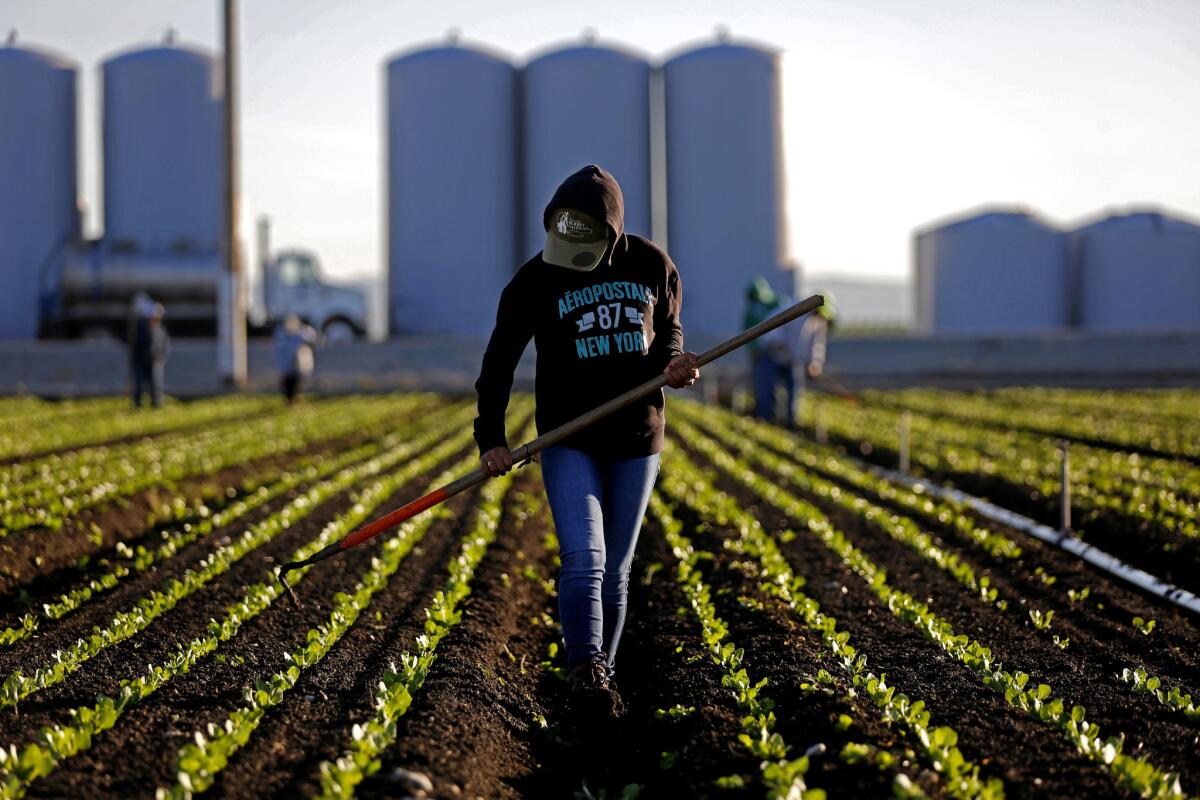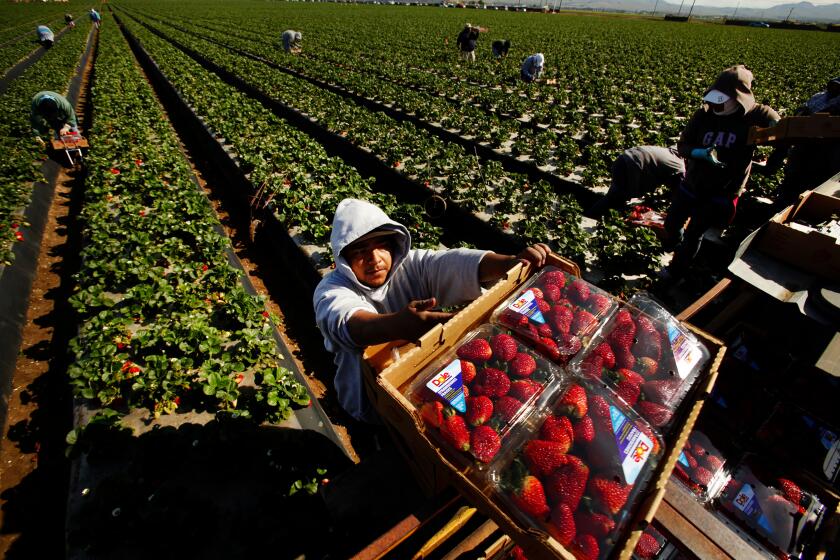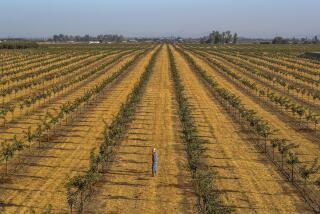Op-Ed: The White House wants to give farmworkers who put food on your table a dire pay cut

- Share via
The Trump administration has found a characteristically churlish way to thank the nation’s foreign guest farmworkers for performing arduous, dangerous work in the face of the coronavirus: It wants to lower their wages. If the shift goes through, it would lead to a pay cut for all those who tend and harvest America’s food.
Roughly 200,000 seasonal guest workers holding H-2A temporary visas will enter the U.S. this year from Mexico and Central America. California will employ about 30,000 of them, a fraction of the state’s 420,000-plus farmworkers. By most estimates, a majority of that labor force are U.S. residents who are in the country illegally. Nonetheless, both the U.S. Department of Homeland Security and Gov. Gavin Newsom have deemed all farmworkers essential during the pandemic. In fact, they are essential, pandemic or not.
Agricultural employers and state health authorities need to act immediately before COVID-19 becomes a major crisis among workers who provide our food supply.
Employers who want to hire foreign guest workers agree to pay them — as well as any U.S. resident workers they hire — a minimum wage determined by the U.S. Department of Agriculture and based on state-by-state surveys of prevailing farm and ranch pay. In California this year, the H-2A rate is $14.77 an hour. That’s significantly higher than the state minimum wage — which is $12 or $13 an hour depending on the size of the operation — but still meager.
Many growers have long lobbied against the H-2A pay rules. If they get their way, farmworkers’ wages would face downward pressure in most states, including California. The effort is led by newly installed White House Chief of Staff Mark Meadows and Agriculture Secretary Sonny Perdue, according to National Public Radio and Wall Street Journal reports last month.
“To reduce their wages at any time would be a matter of deep concern, given that many farmworkers are struggling to feed their own families,” United Farm Workers political director Gieve Kashkooli told reporter Kate Cimini on the website CalMatters. “It would be an even deeper concern to do that during this COVID crisis. And it’s a total insult to them.”
An insult on top of insults. An analysis posted by the Economic Policy Institute, a Washington-based think tank, found that U.S. farmworkers nationally are paid about half the wages of comparable workers in other industries. Meanwhile, growers are the beneficiaries of at least $19 billion in federal coronavirus bailout funds.
Strikingly, many California farmers oppose reducing wages. Casey Creamer, president of California Citrus Mutual, told CalMatters that cutting wages “is just not a thing we do.” The 2,500 family growers he represents would rather see an increase in government paycheck protections and help getting crops to food banks as restaurant and other wholesale demand drops.
Another grower organization, the California Farm Bureau Federation, similarly disapproves of wage cuts. California’s guest farmworkers are most in demand in high-expense agricultural areas such as the Napa and Salinas valleys, where the high cost of living keeps domestic farmworkers away. Bureau President Jamie Johansson said in a statement to The Times that “cutting wages would be contrary” to its goals of maintaining workers’ health and attracting more of them.
If the USDA lowers the H-2A wage, California’s farmworkers could turn out to be collateral damage in an effort to help growers chiefly in the Southeast. In North Carolina, which Meadows represented in Congress before joining the Trump administration in April, the shift to the state minimum wage would save tobacco farmers $5.42 an hour, according to the Wall Street Journal. In Florida, the state that employs the most guest farmworkers, growers would save $3.15 an hour. Tellingly, although the California Farm Bureau opposes the wage cut, its national counterpart, the American Farm Bureau Federation, supports it.
Arnulfo Solorio’s desperate mission to recruit farmworkers for the Napa Valley took him far from the pastoral vineyards to a raggedy parking lot in Stockton, in the heart of the Central Valley.
As the coronavirus spreads from California’s population centers to its agricultural areas, farmworkers are especially vulnerable. The Times reported on efforts by some growers to institute pandemic best practices such as staggered lunch breaks and hand-washing stations in the fields. But in a recent United Farm Workers poll of nonunion California farmworkers, 77% said their employers had not given them information about the virus or changed farming practices.
Most domestic and guest farmworkers live in cramped quarters. Guest workers must be supplied with residences and transportation to the fields, but that might mean as many as 20 people in a four-bedroom house and rides to work in buses and vans too small to make social distancing practical.
Distancing problems may also exist in the fields and packinghouses. Pickers may be spread out in fields but have to run their hauls to central collection areas, and sorting and packing crops may take place on crowded production lines. Hand washing isn’t easy. Personal protective gear is generally lacking, according to Cynthia Rice, director of litigation at California Legal Rural Assistance.
Farmworkers also may have underlying respiratory problems as a result of their work. Few have health insurance or more than the state-mandated three days of paid sick leave. In California, some COVID-19 aid extends to all farmworkers, but that may be of little help in areas with low access to healthcare of any kind.
Trump administration officials haven’t yet issued an executive order or other H-2A rule change lowering guest farmworker wages, but Perdue has said publicly that the wage the visa program establishes is too high. But as the coronavirus crisis has underlined, those whose labor we cannot do without are too often the nation’s lowest paid and its least protected workers.
Instead of seeking a cut in farm wages, the Trump administration should be mandating better work conditions and hazard pandemic pay for those in the agriculture industry. Otherwise, these essential workers will remain indistinguishable from disposable ones.
Jacques Leslie is a contributing writer to Opinion.
More to Read
A cure for the common opinion
Get thought-provoking perspectives with our weekly newsletter.
You may occasionally receive promotional content from the Los Angeles Times.











